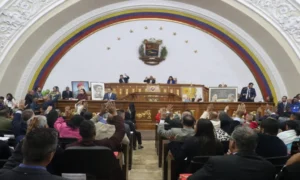
Published 14/08/2023 16:29 | Edited 08/16/2023 07:48
The first news this Monday morning (14) in Argentina was predictable. One day after the chaotic presidential primaries held this Sunday (13) and marked by high abstention (more than 30% of voters), the market was all uproar.
The blue dollar – which is a parallel exchange rate reference in Argentina – broke a record and went from 605 pesos to 670. To avoid further devaluation of the currency, the Central Bank of Argentina set the official exchange rate at 350 pesos per dollar. The basic interest rate shot up 21 points, reaching 118% per annum. Argentine bonds in Wall Street’s “pre-market” plunged 12%.
All because economist Javier Milei, from the far-right ticket A Liberdade Avança, received just over 30% of the votes and led the Open, Simultaneous and Mandatory Primaries (Paso). The market’s favorite ticket, that of the right-wing party “Juntos pelachange”, had 28.7%, but its presidential candidate, former Minister of Security Patricia Bullrich, did not exceed 16.98% of the general votes.
The Peronists, represented on the União Pela Pátria ticket, reached 27.27% of the votes, slightly more than their presidential candidate, the current Minister of Economy, Sergio Massa, who had 21.41%. It was the worst result for Peronism since the adoption of primaries in Argentina in 2011.
The numbers may appear to be somewhat balanced, a near tie – 30.04%, 28.7% and 27.27% – and optimists may say, with some reason, that, after all, the dispute is still open. But the fact is that Argentina is the newest South American country to be engulfed by the ultra-rightist wave.
An avowed fan of Donald Trump and Jair Bolsonaro – and perhaps a worse version of both – Milei sells himself as an anarcho-capitalist, whatever that means. Her project, however, has an unmistakable ultraliberal odor. The presidential candidate wants to abolish the Central Bank, fully dollarize the Argentine economy, privatize the health and education systems, in addition to streamlining the public machine.
They may seem like proposals to the liking of the financial system, but Bolsonaro’s experience in Brazil already serves as a lesson: unpredictable managers are a threat not only to the people – but even to rent seeking. If they lead governments of destruction with a populist facade, so much the worse.
Milei pleased part of the electorate because, like Bolsonaro in 2018, he presented himself as an outsider, although, like the former Brazilian president, he was an inexpressive and outspoken deputy from the lower clergy. By supposedly not belonging to the system, his name would be more accredited to face the “same old things that always failed”.
One of her voters, housewife Adriana Alonso, 42, told Reuters that she chose Milei because of her disillusionment with traditional politicians. “Inflation is killing us and job uncertainty doesn’t allow you to plan your life,” she said. Today, 19.7 million Argentines – 44% of the population – live in poverty. Interestingly, Milei is the most critical candidate for social programs, especially those for income distribution.
With Milei in the Casa Rosada, there may indeed be a policy of fiscal austerity, resuming Argentina’s neoliberal experience. But all alongside a permanent political and social instability, already envisioned by most analysts and market agents.
Until Sunday, due to the recent polls of voting intentions, the “Milei risk” seemed discarded. His candidacy seemed to lose steam, and the bet was that the election itself, in October, would repeat the traditional duel between right and left – Patricia Bullrich versus Sergio Massa.
This was the market’s move to call the shots in the Argentine economy, after supporting, in the last two years, the disastrous impositions of the IMF (International Monetary Fund) on the government of Alberto Fernández and Cristina Kirchner. In the market’s accounts, the crisis would pave the way for Patricia Bullrich’s victory, as Sergio Massa could embody continuity, and Javier Milei, chaos. In other words, the market paid to see (and saw) the advance of the extreme right, with some complicity from the big local media.
Milei’s campaign was coordinated by her sister Karina, who is also a tarot reader and to whom the candidate consults to find out, via letters, whether or not he can trust any politician. In addition to the tarot, the presidential candidate says he has already made decisions through telepathy. Once elected, the “Argentine Bolsonaro” will likely govern for himself – and perhaps for himself – only.
There are just over two months left for the October 22 elections. As the image of polarization in Brazil is exemplary, Peronism has already begun to defend a broad front to prevent the victory of the extreme right. “We need our commitment that the next government is not just about unity in our coalition, but about unity for the country,” said Massa, still on Sunday, before the end of the investigation. The die is cast for the Argentines – including for the market.
Source: vermelho.org.br

